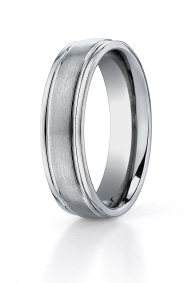
A metallic element, titanium is recognized for its high strength-to-weight ratio.
Titanium as a useful metal alloy was not commonly used until the late 1940s. It is most often alloyed with molybdenum, manganese, iron, and aluminum. By weight titanium is one of the strongest readily available metals, making it ideal for wide range of practical applications. It is 45% lighter than steel with comparable strength, and twice as strong as aluminum while being only 60% heavier.
Titanium is known almost universally as a high-strength, low-weight material (approximately 60% of steel), but it has other very desirable properties as well, most notably high corrosion resistance, and good electrical conductivity. Additionally, in its pure forms (like Grade 2), it is very ductile and easy to work.
Durability
Because of its durability, titanium has become more popular for designer jewelry (particularly, titanium rings).Its inertness makes it a good choice for those with allergies or those who will be wearing the jewelry in environments such as swimming pools. Titanium's durability, light weight, dent- and corrosion- resistance makes it useful in the production of watch cases.
Titanium is lightweight, strong, corrosion resistant and abundant in nature. Titanium and its alloys possess tensile strengths from 30,000 psi to 200,000 psi (210-1380 MPa), which are equivalent to those strengths found in most of alloy steels. The density of titanium is only 56 percent that of steel, and its corrosion resistance compares well with that of platinum. Of all the elements in the earth's crust, titanium is the ninth most plentiful. Titanium has a high melting point of 3135°F (1725°C). This melting point is approximately 400°F (220°C) above the melting point of steel and approximately 2000°F (1100°C) above that of aluminum.
